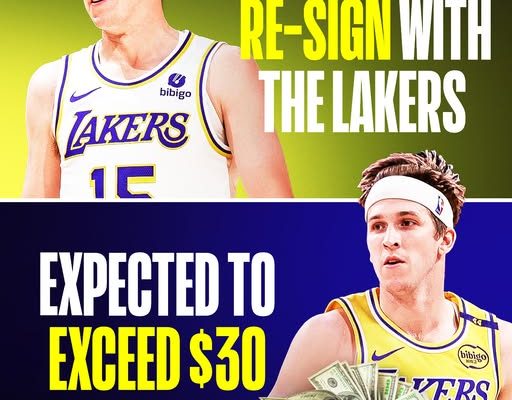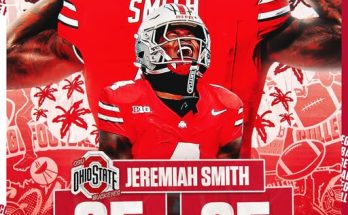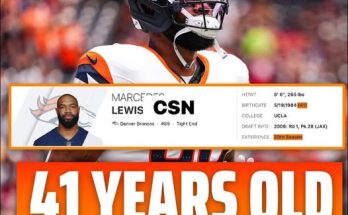The Los Angeles Lakers appear to be inching closer to securing the services of one of their most promising young stars for the foreseeable future. According to several sources close to the situation, Austin Reaves is expected to re-sign with the Lakers on a lucrative deal projected to exceed $30 million per year. This development marks a significant milestone not only in Reaves’ career but also in the Lakers’ broader efforts to build a sustainable core around LeBron James and Anthony Davis as they seek to remain competitive in an evolving and increasingly cutthroat Western Conference.
Reaves, a former undrafted free agent out of Oklahoma, has defied expectations at every turn since entering the league. Initially perceived as a role player with limited upside, Reaves steadily proved doubters wrong through grit, skill, and relentless improvement. His emergence in the 2022-2023 season was no fluke; he followed it up with a solid campaign in 2023-2024, reinforcing the idea that he was not just a fan favorite or feel-good story but a legitimate piece for the Lakers’ future. Averaging 16.8 points, 5.4 assists, and 4.2 rebounds while shooting over 38% from beyond the arc in his third season, Reaves showcased a combination of playmaking, shot creation, and perimeter defense that makes him an incredibly valuable two-way player in today’s NBA.
The Lakers’ front office, under general manager Rob Pelinka, has made it a priority to retain young talent who have proven they can contribute meaningfully alongside superstars. With the aging LeBron James approaching the twilight of his career and Anthony Davis struggling with consistent health over the years, locking in a versatile and durable guard like Reaves becomes even more critical. His ability to play on or off the ball, create in pick-and-roll scenarios, defend multiple positions, and hit clutch shots has turned him into one of the most well-rounded guards on the roster. In many instances last season, Reaves took over the offense late in games, especially when LeBron rested or Davis was out due to injury, and rarely looked overwhelmed by the moment.
What makes the expected contract particularly noteworthy is the scale. A deal surpassing $30 million per year places Reaves in a financial tier typically reserved for All-Star-level players. While he has not yet achieved that individual accolade, his contributions, consistency, and ceiling suggest that such recognition may not be far off. The Lakers’ willingness to invest at this level indicates not only faith in Reaves’ continued growth but also a shift in how the organization views its roster-building philosophy. Instead of gambling on high-profile free agents or aging veterans, Los Angeles is putting its chips behind a homegrown success story, betting that Reaves can be both a complementary star and a foundational leader.
This anticipated move also sends a message to the rest of the league: the Lakers are serious about maintaining internal continuity. Reaves has become a locker-room glue guy, universally respected by teammates for his work ethic, humility, and competitive fire. He fits in culturally with what the Lakers are trying to establish—a balance of showtime flair and blue-collar grind. This is crucial, especially as the team faces a transitional period where the inevitability of LeBron’s eventual retirement looms. Having players like Reaves already embedded in the team’s fabric provides a sense of continuity and identity that can outlast one generation of stars.
The numbers behind the contract may raise some eyebrows around the league, especially among traditionalists who still view contract value through the lens of box score output or All-Star appearances. But NBA economics have shifted dramatically in the last several years. With rising salary caps and the importance of versatility in modern basketball, contracts that once seemed exorbitant now reflect the premium placed on players who can operate across multiple dimensions of the game. Reaves is precisely that kind of player. He doesn’t dominate with flashy numbers but impacts winning in ways that advanced metrics and coaches deeply understand and appreciate. His basketball IQ, defensive instincts, and late-game decision-making are attributes that are hard to teach and even harder to replace.
From a strategic standpoint, the Lakers’ decision to lock in Reaves also offers them some long-term roster flexibility. By securing one of their key assets early, they can better plan for potential trades, free-agent signings, and cap management in future seasons. Reaves, still just 27 years old, fits into both win-now and win-later timelines. If the Lakers remain committed to building a contender around Davis post-LeBron, Reaves could easily be the second or third option on a competitive team—especially if his offensive development continues at its current trajectory. His midrange scoring, ability to draw fouls, and improving three-point shooting make him a viable scoring threat, and his growing comfort handling the ball allows the Lakers to shift responsibilities away from older stars during the regular season.



